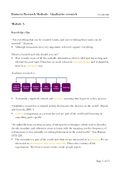Business Research Methods - Qualitative research Iris Lijkendijk
Module A
Knowledge clips
“Not everything that can be counted counts, and not everything that counts can be
counted” - Einstein
• Although measurement is very important, it doesn’t capture everything.
What is research and why should you care?
• How to make sense of all the available information, what is valid and interesting and
relevant for your topic. Therefore we need a descent research design and it should be
done in a systematic way.
Academic research is:
• Systematic, empirical, critical, and iterative (meaning that it goes in cycles) process
“Qualitative research is a situated activity that locates the observer in the world” (Denzin
and Lincoln, : )
• Context is important, as a researcher you are part of the world and focussing on
something quite speci c
“An umbrella term covering an array of interpretive techniques which seek to describe,
decode, translate, and otherwise come to terms with the meaning, not the frequency, of
certain more or less naturally occurring phenomena in the social world.” (Van Maanen,
: )
• The researcher is part of the world, and what we are interested in is meaning. We are
interested in phenomena that occur naturally. This is the contrary of lab
experiments. The focus is more on the social/ people aspect.
Page of
1979
3
1 3 520 2005 3 fi
, “Basically, qualitative researchers are interested in understanding the meaning people
have constructed, that is, how people make sense of their world and the experiences
they have in the world.” (Merriam, : )
• It is about understanding and meaning and it is constructed by people.
Interpretivist (qualitative) approach to the world
• Data is constructed with participants
• Data is expressed in language (e.g., movies, talking, social media posts)
• “Subjective” (it comes from someones perspective)
• Linked to context
• Seeking evidence of meaning
positivist (quantitative) approach to the world
• Data is collected from the ‘real’ world
• Data is expressed in numbers
• “Objective”
• Generalisable (aim: take our ndings and say something about other populations)
• Seeking evidence of frequency
Example: Covid- studies
• Quantitative research: might look at numbers, make use of surveys
• Qualitative research: interest in experiences and feelings and how social practices are
changing in these circumstances
• How is a practice changing and how do people experience and feel about it
Qualitative researchers look for ‘meaning’
• Methods for gathering interpretations:
• Interviews
• Ethnography
• Case studies
• Document analysis
• Focus is on “emic” perspective (you are studying the insider perspective/ the people
that you are studying)
• The researcher’s intuition can be an asset. Meaning that it is useful when you have
the capacity to interpret what people are telling you and have your own take at what is
going on. However you should leave space for an alternative interpretation.
Quantitative researchers look for ‘truth’
• Methods for collecting frequency:
Page of
33
2 19 fi 2014 13
, • Surveys
• Polls
• Questionnaires
• Content analysis (How often a particular word appears in a paper)
• Focus is on “etic” perspective (the outsider perspective)
• Concerned with eliminating bias
• The researcher’s in uence should be minimised
Main things you are looking for when conducting qualitative research:
• Language, interpretations, meaning and experiences
“[Qualitative research] is an effort to understand situations in their uniqueness as part
of a particular context and the interactions there. This understanding is an end in
itself, so that it is not attempting to predict what may happen in the future necessarily,
but to understand the nature of that setting - what it means for participants to be in that
setting, what their lives are like, what’s going on for them, what their meanings are,
what the world looks like in that particular setting - and in the analysis to be able to
communicate that faithfully to others who are interested in that setting… The analysis
strives for depth of understanding.” (Patton, : )
• The emphasis is on understanding (in this particular context)
• We look at interactions
• Purpose: understanding
• The real challenge is how to pass on the knowledge of your research and
communicating it
Logic: How do we arrive at new knowledge?
• Deductive logic (quantitative and top-down) and inductive logic (qualitative and
bottom-up)
Page of
33 fl 1985 1
, What do we do as quantitative researchers?
• Take an interpretivist approach: We interpret an already interpreted world
• Observe qualitative data: usually in a language form
• Use inductive logic: look for patterns and make theoretical contribution
What is qualitative research (Merriam, 2014)
Research - inquiring into, or investigation something in a systematic manner.
• Doing research in order to inform our decisions and to decide on a particular course
of action.
• We can engage in this process to contribute to the knowledge base in a eld (pure
research), improve the practice of a particular discipline (applied research), asses the
value of something (evaluation research), or address a particular, localised problem
(action research)
Basic research - is motivated by intellectual interest in a phenomenon and has as its goal
the extension of knowledge. Primary purpose is to know more about a phenomenon.
Applied research - to improve the quality of practice of a particular discipline. Audience
consists of administrators/ policymakers, people that allow improvement of the way
things are done.
• Evaluation studies
• Difference between evaluation and research (both forms of systematic inquiry)
lies in the questions asked. Evaluation research collects data or evidence on
the worth or value of program, process, or technique. Main purpose is to
establish a basis for decision making.
• “When one examines and judges accomplishments and effectiveness, one is
engaged in evaluation. When this examination of effectiveness is conducted
systematically and empirically through careful data collection and thoughtful
analysis, one is engaged in evaluation research” (Patton, )
• Action research
Page of
33
4
2002 fi





